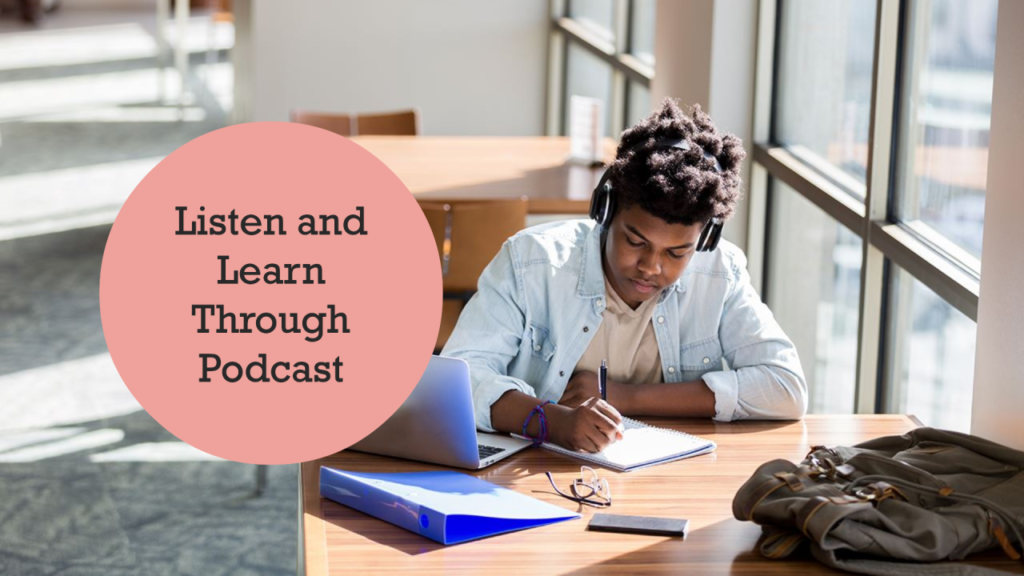Blog
How to Learn a Language with Podcasts
Introduction
Learning a foreign language can be challenging, but with the right tools, it can also be an enjoyable and rewarding experience. One of the most effective and accessible tools available today is podcasts. Whether you’re a beginner or an advanced learner, podcasts offer a flexible way to immerse yourself in a new language. In this blog, we’ll explore how you can make the most of podcasts to boost your language skills.
- Choose the Right Podcasts
The first step is finding podcasts that align with your language level and learning goals. Here are a few tips:

• Beginner Level: Look for podcasts specifically designed for language learners. These often include slow speech, clear pronunciation, and explanations in your native language. Some examples include Coffee Break Languages or Duolingo Podcasts.
• Intermediate Level: Once you’re comfortable with the basics, you can start exploring podcasts that are entirely in the target language. Opt for those that cover topics you’re interested in, as this will keep you engaged. Podcasts like News in Slow Spanish or Intermediate French Podcast are great choices.
• Advanced Level: At this stage, you should challenge yourself with native content. Listen to podcasts made for native speakers on topics like current events, culture, or storytelling. Examples include La Poudre in French or Radio Ambulante in Spanish.
- Make Listening a Daily Habit
Consistency is key when learning a new language. Try to incorporate podcast listening into your daily routine. Here’s how:
• Morning Routine: Start your day by listening to a podcast while you’re getting ready, eating breakfast, or commuting to work.
• Exercise: If you like to exercise, listen to a podcast during your workout. This not only helps you stay consistent with your language practice but also makes exercising more enjoyable.
• Before Bed: Listening to a podcast before bed is a great way to wind down and reinforce what you’ve learned during the day.
- Active Listening vs. Passive Listening
Understanding the difference between active and passive listening can help you get the most out of your podcast sessions:
• Active Listening: This involves fully concentrating on the podcast, taking notes, and even pausing to look up unfamiliar words or phrases. Active listening is particularly useful when you’re trying to learn new vocabulary or understand complex grammar structures.
• Passive Listening: Passive listening occurs when you have the podcast on in the background while doing other tasks. While this method is less focused, it’s still beneficial as it helps you get used to the rhythm and sounds of the language.
A balanced approach combining both active and passive listening can accelerate your language learning process.
- Use Podcasts as a Supplement to Other Learning Methods
Podcasts are a fantastic resource, but they should be used in conjunction with other learning methods. Here’s how you can integrate them:
• Vocabulary Lists: After listening to a podcast, create a vocabulary list of new words and phrases. Review these regularly to reinforce your learning.
• Speaking Practice: Try repeating phrases from the podcast to improve your pronunciation. You can also use the content as a basis for conversation practice with a language partner or tutor.
• Writing Exercises: Write a summary of the podcast in the target language, or even try to transcribe parts of it. This will help improve your writing skills and deepen your understanding of the language.
- Engage with the Podcast Community
Many podcasts have online communities where listeners can connect, share resources, and support each other’s learning journeys. Joining these communities can provide you with additional motivation and opportunities for practice.
• Discussion Forums: Participate in discussions about episodes. This helps reinforce your understanding of the content and allows you to practice writing in the target language.Websites like Reddit or language-specific forums often have dedicated threads for podcast discussions.
• Social Media Groups: Many podcasts have Facebook groups, Twitter hashtags, or other social media platforms where listeners can engage with one another. Joining these groups can help you find study partners, get advice, and stay updated on new episodes or related resources.
• Listener Meetups: Some podcasts organize virtual or in-person meetups for their listeners. These events can be a great opportunity to practice speaking with other learners and to connect with people who share your language-learning goals.
- Be Patient and Persistent
Learning a language is a marathon, not a sprint. It’s important to stay patient and persistent, even when progress feels slow. Podcasts can make the learning process more enjoyable, but consistent effort over time is key to mastering a new language.
• Set Realistic Goals: Break down your language learning into manageable goals, such as listening to one podcast episode daily or learning a certain number of new words each week. Celebrate small victories to keep yourself motivated.
• Track Your Progress: Keep a journal or use language learning apps to track your progress. This could include the number of episodes listened to, new vocabulary learned, or improvements in listening comprehension.
• Stay Motivated: Remember why you started learning the language in the first place. Whether it’s for travel, work, or personal growth, keeping your end goal in mind can help you stay motivated during challenging times.
Conclusion
Podcasts are a powerful tool for learning a foreign language, offering flexibility, variety, and real-world exposure to the target language. By choosing the right podcasts, incorporating them into your daily routine, and combining active and passive listening, you can make significant strides in your language learning journey. Engage with the podcast community, supplement your learning with other methods, and most importantly, be patient and persistent. With these strategies, you’ll find yourself making steady progress towards fluency.
